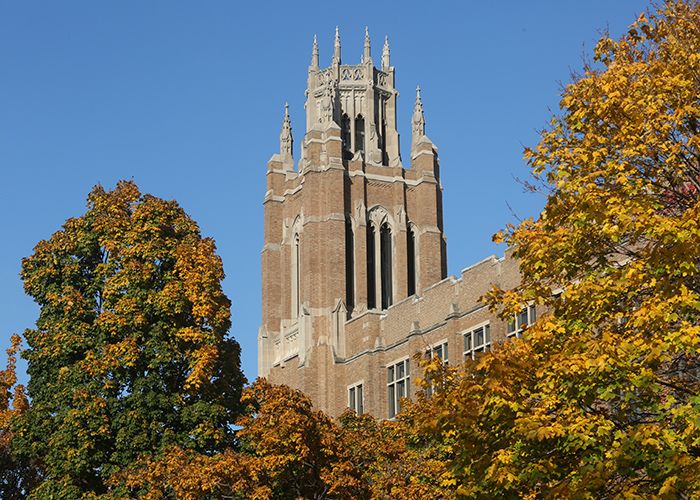2008 Teaching Excellence Awards
Marquette celebrated the 50th anniversary of its Teaching Excellence Awards this year by bestowing its highest teaching honor on four faculty members with “demonstrated ability to inspire students to see the ideals of the university and to cause them to grow in knowledge and scholarship for the glory of God and the good of others.”
“If I were to select one attribute to describe all of this year’s award winners it would be student-centered,” said Dr. Peggy Fong Bloom, vice provost for undergraduate programs and teaching. Bloom also chairs the Committee on Teaching, which selects the award winners each year. “By teaching in a way that inspires, challenges and encourages students to think more broadly and care more passionately about knowledge, faith and service, each award winner not only supports the Marquette mission and vision, but also exemplifies that quality teaching does make a tremendous difference.”
Dr. Rosemary Stuart, professor of biological sciences, received the Robert and Mary Gettel Faculty Award for Teaching Excellence. Dr. Edward de St. Aubin, associate professor of psychology; Dr. Nancy Snow, associate professor of philosophy; and Dr. Amelia Zurcher, associate professor of English; received the Rev. John P. Raynor, S.J., Faculty Awards for Teaching Excellence at the annual Père Marquette Dinner in May 2008.
Dr. Edward de St. Aubin, Psychology
De St. Aubin studies identity and meaning-making in adults, stigmatized groups and those suffering major life disruptions such as spinal cord injury. His teaching philosophy is framed by five self-imposed tenets — never stop learning; respect the “wholeness” of his students; always think about the emotional-cognitive aspects of learning; continually challenge students; and consistently steal good teaching ideas from others. Even though he applies those principles in and outside of academic settings, the classroom remains the center of his approach for learning, sharpening aspirations and making meaning. “I like being surrounded by young minds that are actively being transformed,” he said. “The bottom line is I like teaching.”
Dr. Nancy Snow, Philosophy
Snow teaches theory of ethics, philosophy of law, medical ethics, and the history and philosophy of crime and punishment. She works with students to become aware of the problems in the world, to approach social problems as systemic issues, to look for creative solutions and to feel that they can make a difference in the world. “I love exploring ideas with students, using D2L, designing new courses and innovating in the classroom,” said Snow. “Above all, I love the give and take of interacting with students.” Her hopes are that her classroom work teaches students to think on their own and not simply to accept, without question, what others tell them.
Dr. Rosemary Stuart, Biological Sciences
With an expertise in cell biology and mitochondrial function and regulation, Stuart believes that the true integration of research and education is an essential part of a student’s scientific training. She views her teaching mission as believing in her students so they can learn and use their talents for a greater goal. “If you have been so fortunate to have had such great mentors and teachers who believed in you, as I have had, it's only natural to want to pass that on to the next generation,” said Stuart. “I care a lot about my students and want to them to succeed and feel proud of their accomplishments.”
Dr. Amelia Zurcher, English
With her work in the areas of early modern British literature and culture, genre, gender, and feminist theory, Zurcher aspires to foster real conversation, among students and between students and the materials they're reading. Real conversation requires active listening, intellectual curiosity and a belief in the dignity of every person, according to Zurcher. “What I enjoy about teaching is that it creates substantive, focused and sustained conversations with smart, engaged students,” she said. “I absolutely love it when something in class stimulates a student to have a new idea, one that's important to the student, and he or she realizes how powerful that idea can be.”
